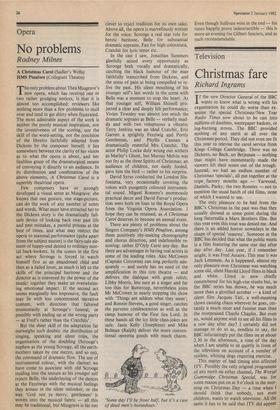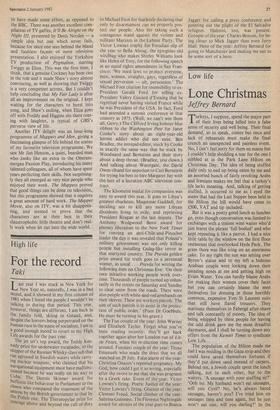Television
Christmas fare
Richard Ingrams
Ithe new Director General of the BBC wants to know what is wrong with his organisation he could do worse than ex- amine the special Christmas/New Year Radio Times now about to be cast into millions of dustbins, wastepaper baskets, or log-burning stoves. The BBC provided nothing of any merit at all over the Christmas period. They did not even see fit this year to televise the carol service from Kings College Cambridge. There was no Dickens, no Bach, no Betjeman — nothing that might have momentarily made the viewers lift their noses out of the trough. Instead, we had an endless number of Christmas 'specials', all put together at the tripe • factory months ago — Yarwood, Daniels, Parky, the two Ronnies — not to mention the usual batch of old films, none of which I wanted tc see.
The only pleasure to be had from the BBC's Christmas in the past was that they usually showed at some point during the long Saturnalia a Marx Brothers film. But this year even this treat was denied me. And there is an added horror nowadays in the shape of special 'seasons'. Someone at the BBC has decided that what the public wants is a film featuring the same star day after day after day. Last year, if I remember aright, it was Fred Astaire. This year it was Jack Lemmon. As it happened, almost my only pleasure over Christmas was watching some old, silent Harold Lloyd films in black and white. Lloyd is now chiefly remembered for his high-rise stunts but, as the BBC series has shown, he was much more than a glorified acrobat — a kind of silent film Jacques Tati, a well-meaning clown causing chaos wherever he goes, cer- tainly a much nicer and funnier man than the overpraised Charlie Chaplin. But even so, would anyone wish to see all his films in a row day after day? I certainly did not manage to do so as, needless to say, the BBC infuriatingly put the films on at about 2.30 in the afternoon, a time of the day when I am unable to sit quietly in front of the television on account of a number of restless, whining dogs requiring exercise.
This matter of bad timing also affected [TV. Possibly the only original programme of any merit on either channel, The Worzel Gummidge Christmas Special, was for some reason put on at 9 o'clock in the mor- ning on Christmas Day — a time when I should think that nobody, not even children, wants to watch television. All the same it has to be said that ITV did appear to have made some effort, as opposed to the BBC. There was another excellent com- pilation of TV gaffes, It'll Be Alright on the Night III, presented by Denis Norden — a simple idea but one which never fails, because for once one sees behind the bland and faultless facade of most television presentation. I also enjoyed the Yorkshire TV production of Pygmalion, starring Twiggy as Eliza. This was the first time, I think, that a genuine Cockney has been cast in the role and it made Shaw's story almost convincing, as well as showing that Twiggy is a very competent actress. But I couldn't help concluding that My Fair Lady is after all an improvement on the original. I kept waiting for the characters to burst into song, and Shaw's ending, when Eliza goes off with Freddy and Higgins sits there roar- ing with laughter, is typical of GBS's perverse view of life.
Another ITV delight was an hour-long programme of Muppets and Men, giving a fascinating glimpse of life behind the scenes of my favourite television programme. We saw Mr Jim Henson, a quiet, bearded man who looks like an extra in the Oberam- mergau Passion Play, introducing his many talented colleagues, all of whom have spent years perfecting their skills. Not surprising- ly they all emerged as very nice people who enjoyed their work. The Muppets proved that good things can be done on television, but this programme showed that it requires a great amount of hard work. The Muppet Movie, also on ITV, was a bit disappoin- ting, and seemed to prove that the characters are at their best in their claustrophobic little theatre and don't real- ly work when let out into the wide world.



































 Previous page
Previous page